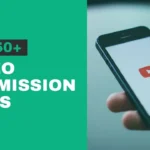Is your website struggling to attract more visitors? Do your competitors consistently outrank you in search engine results? Discover the secrets of SEO and regain control over your website’s visibility with our comprehensive guide.
Today’s digital age, a strong online presence holds immense importance for achieving business success. However, with constantly evolving algorithms and fierce competition, maintaining an edge can prove to be quite challenging. This is precisely why our assistance comes into play. Our comprehensive guide will navigate you through the fundamental principles of search engine optimization, equipping you with essential tools and strategies necessary to enhance your website’s visibility.
From conducting keyword research to optimizing your web pages and building links, this comprehensive guide covers all aspects of SEO. Whether you are a small business owner aiming to boost your online visibility or an experienced marketer seeking to stay abreast of the latest SEO trends, this resource is tailor-made for you. Prepare yourself to unravel the secrets of effective search engine optimization and elevate your website to new heights.
Understanding Search Engines
Search engines play a vital role in determining the visibility of your website. Understanding how they work is essential for optimizing your site effectively. Search engines utilize complex algorithms to analyze and rank websites based on various factors. These factors include relevance, authority, user experience, and more.
To improve your website’s visibility, you need to ensure it aligns with search engines’ expectations. This involves optimizing your content, website structure, and performance. By catering to search engine algorithms, you can increase your chances of ranking higher in search results and attracting organic traffic.
Importance of SEO for Website Visibility
SEO (Search Engine Optimization) is the process of optimizing your website to improve its visibility on search engine results pages (SERPs). It is an essential aspect of digital marketing that enables businesses to reach their target audience effectively.
A well-executed SEO strategy can drive organic traffic to your website, increase brand visibility, and ultimately generate more leads and sales. By optimizing your website for relevant keywords and providing valuable content, you can position your site as a trusted authority in your industry and attract quality traffic.
Without SEO, your website may get lost in the vast sea of online content, making it difficult for potential customers to find you. By investing time and effort into SEO, you can ensure that your website stands out and reaches the right audience.
How Search Engines Rank Websites
Search engines use complex algorithms to rank websites based on their relevance and authority. While the exact algorithms are closely guarded secrets, understanding the key factors that influence rankings can help you optimize your website effectively.
Relevance is determined by factors such as keyword usage, content quality, and user engagement. By incorporating relevant keywords into your content and providing valuable information to users, you can increase your website’s relevance.
Authority, on the other hand, is measured by the number and quality of backlinks pointing to your website. Backlinks act as “votes of confidence” from other websites, indicating that your content is trustworthy and valuable. By building high-quality backlinks, you can improve your website’s authority and increase its chances of ranking higher in search results.
Understanding these ranking factors will help you develop an SEO strategy that focuses on improving both relevance and authority, ultimately boosting your website’s visibility
Keyword Research and Analysis
Keyword research is the foundation of any successful SEO campaign. It involves identifying the keywords and phrases that your target audience is using to search for information related to your products or services.
By conducting thorough keyword research, you can uncover valuable insights into your audience’s search behavior. This information will help you create content that aligns with their needs and preferences, increasing the chances of your website appearing in relevant search results.
When conducting keyword research, it’s important to consider factors such as search volume, competition, and relevance. Look for keywords that have a high search volume but low competition, as these will offer the best opportunities for ranking.
Additionally, consider long-tail keywords, which are more specific and typically easier to rank for. Long-tail keywords often indicate higher purchase intent, making them valuable for driving targeted traffic to your website.
On-Page SEO Optimization Techniques
On-page SEO optimization refers to the practices you implement directly on your website to improve its visibility in search engine results. It involves optimizing various elements, such as content, metadata, and URLs, to make them more search engine-friendly.
One of the most important aspects of on-page optimization is optimizing your content. This includes incorporating relevant keywords naturally throughout your content, using proper heading tags, and providing valuable information that satisfies user intent.
In addition to content optimization, optimizing your metadata is crucial for on-page SEO. Metadata includes elements such as title tags, meta descriptions, and alt text for images. By optimizing these elements with relevant keywords and compelling descriptions, you can improve your website’s visibility in search results and attract more clicks.
URL structure also plays a role in on-page optimization. Ensure that your URLs are concise, descriptive, and include relevant keywords. This will not only make it easier for search engines to understand your website’s content but also improve the user experience.
Off-Page SEO Optimization Techniques
Off-page SEO optimization refers to the practices you employ outside of your website to improve its visibility and authority. It primarily focuses on building high-quality backlinks to your website from other reputable sources.
Building backlinks is crucial for demonstrating your website’s authority and trustworthiness to search engines. The more high-quality backlinks you have, the higher your website is likely to rank in search results.
One effective off-page SEO technique is guest blogging. By writing valuable content for other websites in your industry, you can earn backlinks while establishing yourself as an expert in your field. Additionally, engaging in influencer marketing and social media promotion can help increase your website’s visibility and attract more backlinks.
It’s important to note that off-page SEO should always prioritize quality over quantity. Focus on building backlinks from authoritative websites that are relevant to your industry. Avoid spammy link-building tactics, as they can result in penalties from search engines and harm your website’s visibility.
Technical SEO Best Practices
Technical SEO refers to the practices that focus on improving your website’s technical aspects to enhance its visibility and user experience. While it may sound daunting, implementing technical SEO best practices is essential for optimizing your website effectively.
One of the key aspects of technical SEO is ensuring that your website is easily accessible to search engine crawlers. This involves optimizing your website’s robots.txt file, XML sitemap, and internal linking structure.
Website speed is another crucial factor in technical SEO. Slow-loading websites can negatively impact user experience and search engine rankings. Optimize your website’s loading speed by compressing images, minifying code, and leveraging browser caching.
Mobile optimization is also vital for technical SEO. With the increasing use of mobile devices, search engines prioritize mobile-friendly websites in their rankings. Ensure that your website is responsive and offers a seamless experience across different devices.
Creating High-Quality and Engaging Content
Content is king in the world of SEO. High-quality and engaging content not only attracts readers but also signals to search engines that your website is valuable and relevant.
When creating content, focus on providing value to your audience. Understand their pain points, interests, and needs, and create content that addresses these effectively. Use a mix of informative articles, how-to guides, videos, and infographics to cater to different learning styles.
Incorporate relevant keywords naturally throughout your content, but avoid keyword stuffing. Write for humans first, and optimize for search engines second. By creating content that is well-researched, well-written, and user-friendly, you can increase your website’s visibility and attract organic traffic.
The Role of Social Media in SEO
Social media and SEO are closely intertwined. While social media signals may not have a direct impact on search engine rankings, they can indirectly influence your website’s visibility and engagement.
Social media platforms provide an opportunity to amplify your content and reach a wider audience. By sharing your content on social media, you can increase its visibility and attract more traffic to your website. Additionally, social media engagement, such as likes, shares, and comments, can indicate the value and relevance of your content to search engines.
Social media profiles also contribute to your website’s online presence. Optimizing your social media profiles with relevant keywords, links to your website, and engaging content can improve your brand’s visibility and authority.
Measuring and Tracking SEO Success
To gauge the effectiveness of your SEO efforts, it’s important to measure and track key metrics. This will help you identify areas for improvement and make data-driven decisions to optimize your website further.
Start by setting specific goals and objectives for your SEO campaign. Whether it’s increasing organic traffic, improving keyword rankings, or boosting conversions, clearly define what success looks like for your business.
Utilize tools such as Google Analytics and Google Search Console to track important metrics like organic traffic, bounce rate, average session duration, and conversion rates. These tools provide valuable insights into user behavior, keyword performance, and website health.
Regularly analyze and interpret the data to identify trends and patterns. Adjust your SEO strategy accordingly based on the findings. Remember, SEO is an ongoing process, and continuous monitoring and optimization are necessary for long-term success.
Common SEO Mistakes to Avoid
However, you should also ensure that common mistakes are avoided to prevent harming your rankings. Avoiding these mistakes will ensure positive results from your SEO efforts.
One common mistake is over-optimizing your website, which can lead to penalties from search engines and hinder your website’s visibility. Instead, prioritize providing valuable information to your audience over quantity. Optimize your website by naturally delivering value to your customers.
Another significant mistake is not optimizing for mobile devices. Nowadays, every company interacts with mobile devices in various ways. Therefore, search engines consistently rank websites that strike a balance between onsite and offsite techniques. Mobile optimization should be an essential part of your site.
The absence of regular content maintenance and updates can result in poor rankings. Search engines favor websites that consistently produce fresh and valuable content. By regularly publishing new articles, blog posts, or other fresh content, you can improve your ranking position and perform routine tasks while engaging in creative work.
SEO Tools and Resources
There are many tools and resources available to make your journey to search engine optimization smoother and less hassle-filled. These tools can help you focus on keyphrase analysis, web page evaluation, backlink examination, and more.
Keyword research tools, such as SEMrush, Ahrefs, and Google Keyword Planner, help identify different search volumes, competition, related keywords, and phrases. They also assist in determining high-potential keywords for improving content ranking.
On-page optimization tools can provide keyword suggestions, usage tips, and guide you through the proper use of keywords in content fields. They can also help with URL preference selection and offer advice on size adjustment.
To monitor backlinks and analyze your website’s link profile, tools like Majestic and Moz Link Explorer are invaluable. These tools provide comprehensive insights into your backlink profile and help you identify opportunities for improvement.
Additionally, there are numerous online communities, forums, and blogs dedicated to SEO. These resources offer valuable insights, tips, and discussions on the latest SEO trends and techniques. Engaging with these communities can help you stay updated and improve your SEO knowledge.
Conclusion
Unlocking the secrets of SEO will improve your website’s visibility and organically bring it through the gates of its five senses. To attain your ultimate goal, there are a few things required. Namely, understanding how search engines work by thoroughly analyzing keywords, gaining wisdom on off-page and on-page optimization, and providing high-quality content. With this knowledge, you can boost the chances of your domain/website ranking higher in search results.
SEO is an ongoing process that involves staying updated with the newest trends, avoiding common mistakes (or better yet, refraining from making any new ones) in digital marketing, optimizing the adoption or use of Search Engine Optimization techniques, and employing the right tools and resources. By following these practices, your website has the potential to soar and become visible to anyone as a result of the unlocked success here.











